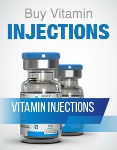Injectable Vitamins for Humans Benefits and Considerations
Injectable vitamins have become increasingly popular, offering an alternative way to deliver essential nutrients directly into the bloodstream. But are they right for everyone? This blog explores the world of injectable vitamins for humans, their potential benefits, and important factors to consider before taking the plunge.
Visit Official Website: TeleWellnessmd
What are Injectable Vitamins?
Injectable vitamins are exactly what they sound like – vitamins delivered through an injection into a muscle or vein. This bypasses the digestive system, allowing for faster and more complete absorption compared to oral supplements.
Benefits of Injectable Vitamins
There are several potential benefits to consider with injectable vitamins:
- Faster Absorption: Injections deliver vitamins directly into the bloodstream, bypassing the digestive system. This can be particularly helpful for people with digestive issues that hinder nutrient absorption.
- Higher Bioavailability: Some vitamins, like B12, have lower bioavailability when taken orally. Injections deliver a higher percentage of the vitamin directly to the cells.
- Effective for Deficiencies: For individuals with diagnosed vitamin deficiencies, injectable vitamins can be a reliable way to replenish stores and address symptoms quickly.
- Convenient Option: For those who struggle to swallow pills or have difficulty maintaining a consistent oral supplement routine, injections can offer a convenient alternative.
Types of Injectable Vitamins
-
- Vitamin B Complex: B vitamins play a crucial role in energy production, metabolism, and nervous system function. Injections are often used to address B12 deficiencies.
- Vitamin C: An essential antioxidant, vitamin C supports the immune system and collagen production. Injections are sometimes used for high-dose needs or people with absorption issues.
- Vitamin D: Crucial for bone health and immune function, vitamin D deficiency is common. Injections may be recommended for those with severe deficiencies.
Important Considerations
While injectable vitamins offer potential benefits, it’s important to be aware of some key factors:
- Not a Magic Bullet: Injectable vitamins are not a quick fix for overall health. A balanced diet and healthy lifestyle habits remain essential.
- Consult a Doctor: Before starting injectable vitamins, consult a doctor to assess your individual needs and determine if injections are necessary.
- Potential Side Effects: Like any medication, injectable vitamins can have side effects, though usually mild. These can include injection site discomfort, nausea, or allergic reactions.
- Cost: Injectable vitamins can be more expensive than oral supplements.
- Not a Substitute for Diagnosis: Don’t self-diagnose a vitamin deficiency. Consult a doctor for proper diagnosis and treatment.
Who Might Benefit from Injectable Vitamins?
- People with Diagnosed Deficiencies: If a doctor confirms a vitamin deficiency, injectable vitamins can be an effective way to address it.
- Individuals with Digestive Issues: Those with digestive problems that hinder nutrient absorption may benefit from injectable vitamins.
- People Who Struggle with Oral Supplements: For those who have difficulty swallowing pills or maintaining a consistent oral supplement routine, injections can offer a convenient alternative.
Alternatives to Injectable Vitamins
Before considering injectable vitamins, explore these alternatives:
- Balanced Diet: Focus on a balanced diet rich in fruits, vegetables, and whole grains to get most of your vitamins naturally.
- Oral Supplements: For most people, high-quality oral supplements can effectively address mild vitamin deficiencies.
- Lifestyle Changes: Getting enough sleep, managing stress, and regular exercise can significantly improve overall health and potentially reduce the need for additional supplements.
Consulting a Doctor is Key
Always consult your doctor before starting injectable vitamins. They can assess your individual needs, perform blood tests to check for deficiencies, and determine if injectable vitamins are the right approach for you. They can also recommend appropriate dosages and injection schedules.
The Takeaway:
Injectable vitamins can be a valuable tool for addressing diagnosed vitamin deficiencies. However, consult a doctor before starting any injections. Focus on a balanced diet, healthy lifestyle habits, and talk to your doctor about the best approach for maximizing your vitamin intake and overall health. Remember, injectable vitamins aren’t a one-size-fits-all solution and may not be necessary for everyone.

